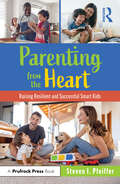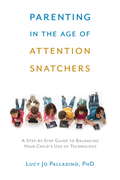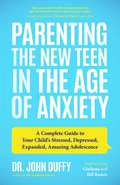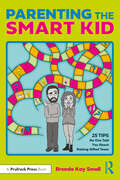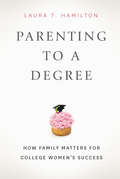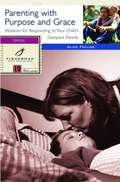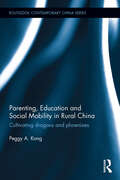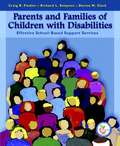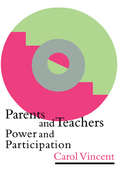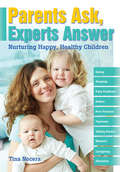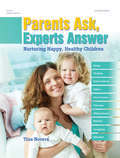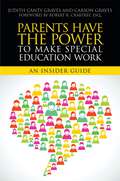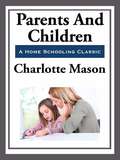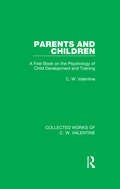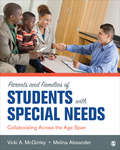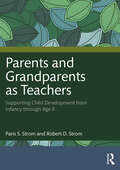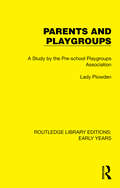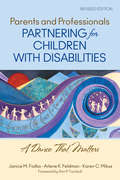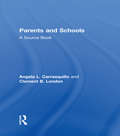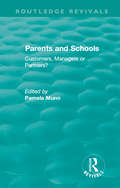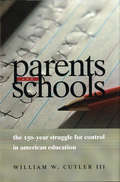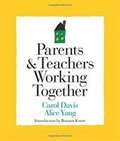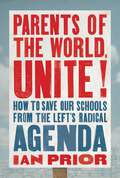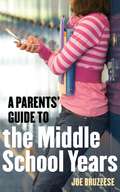- Table View
- List View
Parenting from the Heart: Raising Resilient and Successful Smart Kids
by Steven I. PfeifferParenting from the Heart is a fresh, accessible, authoritative pocket book for helping your gifted, bright, or creative child become resilient and psychologically vibrant, both in and out of the classroom! Engaging chapters explore how to support your child’s social-emotional development through teaching, reinforcing, and modeling the author’s research-based framework “strengths of the heart,” championing the dynamic trio of Emotional Intelligence, social skills, and character strengths. Featuring diverse, illustrative examples, effective interventions, and frequently asked questions to help you put concepts into practice, this book offers essential information for raising and supporting responsible, caring, empathic, and resilient gifted children. This book is a must read for all caregivers seeking to get ahead of potential behavioral, academic, and social challenges while building a healthy foundation to become a calm, reflective, and thoughtful parent.
Parenting in the Age of Attention Snatchers: A Step-by-Step Guide to Balancing Child's Use of Technology
by Lucy Jo PalladinoAre your kids glued to their screens? Here is a practical, step-by-step guide that gives parents the tools to teach children, from toddlers to teens, how to gain control of their technology use. As children spend more of their time on tablets and smartphones, using apps specially engineered to capture their attention, parents are becoming concerned about the effects of so much technology use--and they feel powerless to intervene. They want their kids to be competent and competitive in their use of technology, but they also want to prevent the attention and behavioral problems that can develop from overuse.In this guide, Lucy Jo Palladino doesn't demonize technology; instead she gives parents the tools to help children understand and control their attention--and to recognize and resist when their attention is being "snatched." Palladino's straightforward, evidence-based approach applies to kids of all ages. Parents will also learn the critical difference between voluntary and involuntary attention, new findings about brain development, and what puts children at risk for attention disorders.
Parenting the New Teen in the Age of Anxiety: A Complete Guide to Your Child's Stressed, Depressed, Expanded, Amazing Adolescence
by Dr. John Duffy Dr.A clinical psychologist offers an accessible guide to the &“New Teen&” and how parents can adjust to raising them in this emotionally challenging world. Kids are growing up with nearly unlimited access to social media and the Internet, and unprecedented academic, social, and familial stressors. Starting as early as eight years old, children are exposed to information, thought, and emotion that they are developmentally unprepared to process. As a result, saving the typical &“teen parenting&” strategies for thirteen-year-olds is now years too late. With this parenting book, Dr. John Duffy, a nationally recognized expert in parenting for nearly twenty-five years, offers a necessary guide that addresses this hidden phenomenon of the changing teenage brain. This is a guide for parents raising children who are growing up quickly and dealing with unresolved adolescent issues that can lead to anxiety and depression. Because of the unprecedented exposure they face, kids are emotionally overwhelmed at a young age, often continuing to search for a sense of self well into their twenties. Paradoxically, Dr. Duffy recognizes the good that comes with these challenges, such as the sense of justice instilled in teenagers starting at a young age. Readers of this book will: Sort through the overwhelming circumstances of today&’s teens and better understand the changing landscape of adolescence Come away with a revised parenting plan more suited to addressing the current needs of the New Teen Discover the joy in parenting again by reclaiming the role of your teen&’s ally, guide, and consultant Perfect for readers of parenting books like The Yes Brain, How to Raise an Adult, The Deepest Well, and The Conscious Parent.
Parenting the Smart Kid: 25 Tips No One Told You About Raising Gifted Teens
by Brenda Kay SmallParents of Smart Kids know they can have complex social, emotional, and intellectual needs. This resource condenses the wisdom and experience of teachers and school leaders who have experienced thousands of students with the same needs into 25 key tips for parents seeking to help their Smart Kids thrive. Featuring 25 illustrated strategies for navigating situations unique to Smart Kids, with confident, informed support given every step of the way, this book covers topics such as: What to do when a Smart Kid thinks they are smarter than everyone else, How to motivate a Smart Kid who is bored of school, How are the Smart Kid perfectionist and procrastinator related? It’s not all bad. How to navigate alternatives to regular school classes and other acceleration opportunities Where to find valuable mentors in your community. When and how to act when the Smart Kid is too cool for school. What are the benefits and costs of homeschooling Smart Kids? Parents have great power in schools. Know when and how to use your power. What to do when the Smart Kid finally has a class that is not easy. And much more! Parents are not alone on this complex journey. Take each tip and apply it. Watch Smart Kids thrive with an informed and confident parent. Full of relevant tried-and-true suggestions that are immediately implementable solutions to the common challenges of parenting Smart Kids, this invaluable resource is a must have for parents seeking to confidently navigate the exciting and challenging journey of their Smart Kid's teen years.
Parenting to a Degree: How Family Matters for College Women's Success
by Laura T. HamiltonHelicopter parents--the kind that continue to hover even in college--are one of the most ridiculed figures of twenty-first-century parenting, criticized for creating entitled young adults who boomerang back home. But do involved parents really damage their children and burden universities? In this book, sociologist Laura T. Hamilton illuminates the lives of young women and their families to ask just what role parents play during the crucial college years. Hamilton vividly captures the parenting approaches of mothers and fathers from all walks of life--from a CFO for a Fortune 500 company to a waitress at a roadside diner. As she shows, parents are guided by different visions of the ideal college experience, built around classed notions of women's work/family plans and the ideal age to "grow up." Some are intensively involved and hold adulthood at bay to cultivate specific traits: professional helicopters, for instance, help develop the skills and credentials that will advance their daughters' careers, while pink helicopters emphasize appearance, charm, and social ties in the hopes that women will secure a wealthy mate. In sharp contrast, bystander parents--whose influence is often limited by economic concerns--are relegated to the sidelines of their daughter's lives. Finally, paramedic parents--who can come from a wide range of class backgrounds--sit in the middle, intervening in emergencies but otherwise valuing self-sufficiency above all. Analyzing the effects of each of these approaches with clarity and depth, Hamilton ultimately argues that successfully navigating many colleges and universities without involved parents is nearly impossible, and that schools themselves are increasingly dependent on active parents for a wide array of tasks, with intended and unintended consequences. Altogether, Parenting to a Degree offers an incisive look into the new--and sometimes problematic--relationship between students, parents, and universities.
Parenting with Purpose and Grace: Wisdom for Responding to Your Child's Deepest Needs (Fisherman Bible Studyguide Series)
by Alice FrylingLearning to Love Your Children WellThe challenges of parenting can sometimes feel overwhelming. What do we do when we run out of patience? How do we handle our anger when it seems to be getting the best of us? Where do we find the affirmation our children need? Alice Fryling invites you to discover what the Bible says about how to reflect the love, wisdom, and grace of God in your parenting. Scripture gives us stories and truths about parenting and describes our relationship with God in a way that goes beyond "answers." With wisdom and authenticity, this guide discusses how God parents us, how to pray for our kids, how to handle our own fears and failures, and how to entrust our children to God.From the Trade Paperback edition.
Parenting, Education, and Social Mobility in Rural China: Cultivating dragons and phoenixes (Routledge Contemporary China Series)
by Peggy A. KongLike many countries around the world, China has been implementing policies aimed at improving parent-school relationships. However, unlike many developed countries, the historical context of family-school relationships has been limited and parents typically do not participate in the school context. Until now, there has been little research conducted in rural China on parental involvement in their children’s education. This book investigates the nature of parental involvement in primary children’s education in rural China by using a combination of quantitative and qualitative methods. It outlines the layered strategies of how rural parents are involved in their children’s schooling, showing that rural parents strongly desire educational success for their children and view education as a means to their children gaining social mobility. It demonstrates that few rural parents engage in visible forms of parental involvement in their children’s schools, such as attending parent-teacher meetings. Rather, they are more likely to engage strategies to support their children’s education which are largely invisible to schools. It adds to the growing body of parental involvement research that suggests that culture, location, and socio-economic status influence different forms of parental involvement, and highlights nuances in invisible forms of parental involvement. Providing insights into how poor rural parents envision their role with their children, schools, and the larger society, and how these relationships can affect the social mobility of students and families, this book will be of huge interest to students and scholars of Asian education, comparative and international education, and Chinese society.
Parents And Families Of Children With Disabilities: Effective School-Based Support Services
by Richard L. Simpson Denise M. Clark Craig R. Fiedler Patricia J. Fewell William J. GibbsParents and Families of Children with Disabilities: Providing Effective School Based Support Services provides teachers and paraprofessionals with necessary motivation, research-based practices, skills, and resources to collaborate effectively wiith familes to develop family-centered schools. The book challenges educators to rethink the traditional roles and responsibilities of public schools, training teachers and paraprofessionals how to achieve effective stress management, child advocacy, and transition planning, as well as how to provide academic intervention for the families of children with disabilities and the diverse communities that surround them. General K-12 inservice teachers, paraprofessionals, and parents.
Parents And Teachers: Power And Participation
by Carol VincentThis work examines the factors that shape and influence home-school relations. At its heart is an analysis of parent-teacher relationships in an inner city borough, drawn from case studies of five primary schools and a parents' centre. Interviews with parents are revealing windows into parents' views on a range of issues, including curriculum, discipline and parents' relationships with their children's teachers.; The author also considers teachers' perspectives on these matters, and explores the influence of social class, ethnicity and gender on parent-teacher interactions. While presenting these issues within a consideration of broader themes such as citizenship, community, power and participation, the book discusses the reasons why initiatives designed to improve home- school relations appear to result in such limited change.
Parents Ask, Experts Answer: Nurturing Happy, Healthy Children
by Tina NoceraParents often assume that other parents have it all figured out, that other parents have all the answers. But, all parents face complex problems that cannot be solved with a one-size-fits all answer. Tina Nocera, founder of Parental Wisdom and author of Parents Ask, Experts Answer, believes that a parent knows his own child best and is the expert on that child. In Parents Ask, Experts Answer, Nocera brings together a panel of thirty-five child-development experts to offer advice on some of the most challenging issues that parents face. By presenting multiple solutions to each issue, parents are empowered to choose a realistic solution that is right for their family.
Parents Ask, Experts Answer: Nurturing Happy, Healthy Children
by Tina NoceraWho’s the expert on your child? You are! But, what if you need validation? What if you need support? What if you have questions? As a parent, you may assume others have it all figured out—that there is some kind of magic decoder ring or secret handshake that will give you the key to parenting. But, if each child is unique, how can there be a one-size-fits-all guide to parenting? Although no one can has it all figured out, Parents Ask, Experts Answer empowers you by offering caring, informed responses from a variety of trusted professionals. In Parents Ask, Experts Answer, Tina Nocera, founder of Parental Wisdom, brings together a panel of thirty-five experts to offer advice on some of the most challenging issues faced by parents: discipline bullying behavior sleep caregivers play family relationships siblings separation special needs education friendship technology peer pressure money By presenting multiple solutions to each challenge, Parents Ask, Experts Answer helps you see that there may be several right answers to a problem. You will be empowered to choose a realistic solution that is right for your family.
Parents Have the Power to Make Special Education Work: An Insider Guide
by Carson Graves Judith Canty GravesWritten by parents who have been through the US special education system, this book cuts through the jargon to provide other parents with a no-nonsense road map full of valuable first-hand insights and tried-and-tested advice. The authors clearly describe: · the special education process, including the school hierarchies parents are likely to encounter and etiquette to be aware of when dealing with school personnel · the information parents should expect to see in school evaluations and Individualized Education Programs (IEPs), and what to do when this information is missing or insufficient · problems parents may encounter when the needs of the school conflict with the needs of a child, including how to deal with such situations and when to seek legal advice · the importance of organizing special education documentation and establishing a 'paper trail', and how to begin this process · why transition planning is so important, and transition services parents may want to consider for their child. Demonstrating that parents really do have the power to make special education work for their child, this empowering guide is essential reading for parents of children with disabilities who are new to the special education system in the US, as well as those who feel frustrated with the system.
Parents and Children
by Charlotte MasonParents and Children consists of a collection of 26 articles from the original Parent's Review magazines to encourage and instruct parents. Topics include The Family; Parents as Rulers; Parents as Inspirers; Parents as Schoolmasters; The Culture of Character; Parents as Instructors in Religion; Faith and Duty (a secular writer has useful suggestions for using myths and stories to teach morals; along with the Bible, these can give examples of noble characters to emulate); Parents' Concern to Give the Heroic Impulse; Is It Possible?; Discipline; Sensations and Feelings Educable by Parents; What is Truth? (Dealing with Lying); Show Cause Why; A Scheme Of Educational Theory; A Catechism of Educational Theory; Whence and Whither; The Great Recognition Required of Parents; and The Eternal Child. Charlotte Mason was a late nineteenth-century British educator whose ideas were far ahead of her time. She believed that children are born persons worthy of respect, rather than blank slates, and that it was better to feed their growing minds with living literature and vital ideas and knowledge, rather than dry facts and knowledge filtered and pre-digested by the teacher. Her method of education, still used by some private schools and many homeschooling families, is gentle and flexible, especially with younger children, and includes first-hand exposure to great and noble ideas through books in each school subject, conveying wonder and arousing curiosity, and through reflection upon great art, music, and poetry; nature observation as the primary means of early science teaching; use of manipulatives and real-life application to understand mathematical concepts and learning to reason, rather than rote memorization and working endless sums; and an emphasis on character and on cultivating and maintaining good personal habits. Schooling is teacher-directed, not child-led, but school time should be short enough to allow students free time to play and to pursue their own worthy interests
Parents and Children: A First Book on the Psychology of Child Development and Training (Collected Works of C.W. Valentine)
by C.W. ValentineBy his wide influence as author and teacher C.W. Valentine had established himself as a leading authority in this country on child psychology applied to early training. Originally published in 1953, this was a book for parents who need help and advice in bringing up their children and who were puzzled by the obscure and often contradictory assertions of child psychologists. This book deals with the earliest problems – feeding, weaning, sleep, etc.; it then goes on to early discipline, first school difficulties and adolescence. The great individual differences in children, frequently in the same family, are stressed, so that parents would not be so ready to imagine behaviour to be abnormal. It also sought to help parents understand themselves in their attitude towards their children. As teachers, social and religious workers, children’s welfare officers and nurses, were increasingly brought into touch with parents to discuss with them the upbringing of their children, it was hoped that this book would be of use to those groups as well as to parents themselves.
Parents and Families of Students With Special Needs: Collaborating Across the Age Span
by Dr Vicki A. McGinley Dr Melina AlexanderParents and Families of Students With Special Needs: Collaborating Across the Age Span teaches students the skills they need to effectively collaborate with parents and families to ensure a child's success in the classroom. Authors Vicki A. McGinley and Melina Alexander’s text takes a lifespan approach with a special emphasis on the critical transition points in a child’s life. Information is provided on what can be seen at each stage of an individual with disabilities’ development, and addresses concerns and needs that families may have during these unique phases of growth. Chapters written by professors and professionals who are also parents of students with special needs bring a diverse range of voices into the narrative. The authors provide an in-depth discussion of how parents and families are affected by particular disabilities, family system theory, the laws that affect individuals with disabilities, and assessments for individuals with disabilities.
Parents and Families of Students With Special Needs: Collaborating Across the Age Span
by Dr Vicki A. McGinley Dr Melina AlexanderParents and Families of Students With Special Needs: Collaborating Across the Age Span teaches students the skills they need to effectively collaborate with parents and families to ensure a child's success in the classroom. Authors Vicki A. McGinley and Melina Alexander’s text takes a lifespan approach with a special emphasis on the critical transition points in a child’s life. Information is provided on what can be seen at each stage of an individual with disabilities’ development, and addresses concerns and needs that families may have during these unique phases of growth. Chapters written by professors and professionals who are also parents of students with special needs bring a diverse range of voices into the narrative. The authors provide an in-depth discussion of how parents and families are affected by particular disabilities, family system theory, the laws that affect individuals with disabilities, and assessments for individuals with disabilities.
Parents and Grandparents as Teachers: Supporting Child Development from Infancy through Age 8
by Robert D. Strom Paris S. StromA guide for families in teaching infants through age 8, this insightful book showcases how both parents and grandparents can support greater family success, and how creative collaboration can produce benefits for each generation.Having developed the nation’s first curriculum for grandparents and field-tested the intervention program with support from the American Association of Retired Persons, the authors explore topics like trust in infancy, family conversations and child language, praise and encouragement, alone time, peer influence, resilience, and cultural diversity. To bring family members closer together and support child development, each chapter includes principles for application, ten key concepts and questions for reflection. Readers can benefit from the Generational Perspectives Activities presented at the end of each chapter, and available online, that recommend topics for family conversations and self-evaluation for parents and grandparents.This book will be invaluable for parent and grandparent readers and may also be of interest to students majoring in family studies and developmental psychology and those preparing to become early childhood or elementary school teachers.
Parents and Playgroups: A Study by the Pre-school Playgroups Association (Routledge Library Editions: Early Years)
by Pre-school Playgroups AssociationOriginally published in 1981 to mark the twentieth anniversary of the birth of the Pre-school Playgroups Association, Parents and Playgroups brings together three wide-ranging reports which examine the role of the playgroup movement, its underlying philosophy and the contribution made by both playgroups and Mother and Toddler groups to the lives of thousands of mothers and children throughout Britain at the time. Formed following a letter to the Guardian in 1961, the PPA together with its sister organization the Scottish PPA had a membership of approaching 16,000 playgroups, serving nearly half a million children. Yet there had been very little research into the workings of the movement until 1975, when Barclays Bank funded a major research project which resulted in the three reports Parental Involvement in Playgroups, Mother and Toddler Groups and Patterns of Oversight published in this volume. The many questions explored and debated include: How should the playgroup movement develop in the 1980s and after? What do parents contribute to playgroups – and what do playgroups and Mother and Toddler groups offer in return? Should Social Service Departments take over the running of playgroups and Mother and Toddler groups? Do local authorities give playgroups enough support? Or does statutory ‘oversight’ inhibit flexibility and imaginative development? Are playgroups and Mother and Toddler groups too middle-class oriented – and do they work equally well in different kinds of neighbourhood? How do playgroups compare with nursery schools? As Lady Plowden writes in her Foreword, ‘the three studies will serve as an introduction to the developed thinking of the association, and point to further areas of research. They describe something increasingly vital in our present society, which is so often rootless and purposeless, as the group studying parental involvement says "one of the greatest strengths of the playgroup movement is that overall it is a positive force in a largely negative society."’ In the words of Max Patterson, President of the Scottish PPA: ‘This is a valuable set of studies… There is a challenge in the material to those with power to effect change. The experience and hard-earned knowledge of the Playgroups Association raises important questions for all whose interest is family and pre-school child.’
Parents and Professionals Partnering for Children With Disabilities: A Dance That Matters
by Janice M. Fialka Arlene K. Feldman Karen C. MikusCultivate effective partnerships between parents and professionals Written from both the parent’s and the professional’s points of view, this book draws upon the metaphor of dance to highlight the essential partnership between teachers, administrators, support staff, and parents of children with disabilities. Rich with humor and heart, the book offers helpful steps for self reflection, personnel preparation, and parent-professional training. Key features include: Practical insights and evidence-based approaches to forming partnerships Easy-to-read, non-technical language that speaks to both the heart and the mind Sample letters, conversations, and other forms of communication between professionals and parents Effective ways to handle difficult situations
Parents and Schools: A Source Book
by Angela L. Carrasquillo Clement B. LondonFirst Published in 1993. Routledge is an imprint of Taylor & Francis, an informa company.
Parents and Schools: Customers, Managers or Partners? (Routledge Revivals)
by Pamela MunnPublished in 1993, this book explores the rights that parents have been given over their children’s schooling. Parents now have the right to choose the school their children will attend and to be involved with school management. These rights and roles for parents as customers and managers are intended to make schools more responsive to parental concerns and to improve school quality. This book considers these new roles of parents, how they affect traditional notions of home-school partnerships, and the effect on schools. It will appeal to those interested in home-school relations, in educational governance, and in comparing British policy in these areas with that of Europe.
Parents and Schools: The 150-Year Struggle for Control in American Education
by William W. Cutler IIIWho holds ultimate authority for the education of America's children—teachers or parents? Although the relationship between home and school has changed dramatically over the decades, William Cutler's fascinating history argues that it has always been a political one, and his book uncovers for the first time how and why the balance of power has shifted over time. Starting with parental dominance in the mid-nineteenth century, Cutler chronicles how schools' growing bureaucratization and professionalization allowed educators to gain increasing control over the schooling and lives of the children they taught. Central to his story is the role of parent-teacher associations, which helped transform an adversarial relationship into a collaborative one. Yet parents have also been controlled by educators through PTAs, leading to the perception that they are "company unions. " Cutler shows how in the 1920s and 1930s schools expanded their responsibility for children's well-being outside the classroom. These efforts sowed the seeds for later conflict as schools came to be held accountable for solving society's problems. Finally, he brings the reader into recent decades, in which a breakdown of trust, racial tension, and "parents' rights" have taken the story full circle, with parents and schools once again at odds. Cutler's book is an invaluable guide to understanding how parent-teacher cooperation, which is essential for our children's educational success, might be achieved.
Parents and Teachers Working Together
by Carol Davis Alice YangWorking with diverse family cultures, Setting the stage for a positive relationship during the early weeks of school, Keeping in touch all year long, Talking with parents about child development, Involving all parents, including those who can't make it to school, Helping parents understand classroom practices, Problem-solving with parents.
Parents of the World, Unite!: How to Save Our Schools from the Left's Radical Agenda
by Ian PriorThis essential playbook reveals the winning strategies for successfully fighting a radical woke agenda in your kids&’ schools. Ian Prior is one of the most articulate and successful parent-activists in the United States. Armed with 12 inspiring battle-tested rules and revealing stories about sparring with self-righteous Woke neighbors (the &“Chardonnay Antifa&”), Ian shares secrets about what fellow parents can do in their own school districts to stop the Left's dark vision from taking root. Get ready to laugh. This is not a boring education book. With real world lessons and funny anecdotes readers can connect with, Ian explains how families can win the battle to stop divisive and dangerous concepts rooted in critical race theory and other dangerous left-wing ideologies from spreading to their schools. He convincingly makes the case that the Left envisions a public education system in America where children are no longer the responsibility of their parents but rather mere wards of the state. You&’ll be shocked and amused by the outrageous stories in Ian&’s suburban county that unexpectedly became ground zero for the parents&’ rights movement. This sign-of-the times book helpfully explains the confusing and infuriating cultural moment we find ourselves in.Parents of the World, Unite! is an indispensable book for American families who believe they should be able to raise their children without government interference in their moral, religious, and ethical choices -- and are ready to join a revolution of parents.
Parents' Guide to the Middle School Years
by Joe BruzzeseOMG PAW G2G. Oh my god, parents are watching, got to go.Today's text-messaging middle schoolers may seem like a different species from how parents remember themselves as sixth, seventh, and eighth graders. Children are often forced to confront serious issues like drugs, violence, sexuality, and technology at an age that would have been unthinkable even a decade ago. So it's natural for parents to worry about these crucial years. Still, educator Joe Bruzzese believes that this time can be full of positive transformation as your child gains independence and your parental role shifts from omnipresent manager to supportive coach. Timely topics include cyberbullying, depression, and choosing realistic and rewarding extracurricular activities.The middle school years can and should be a time of exciting change and opportunity; A Parents' Guide to the Middle School Years presents what you need to know to survive and thrive as a family.From the Trade Paperback edition.
